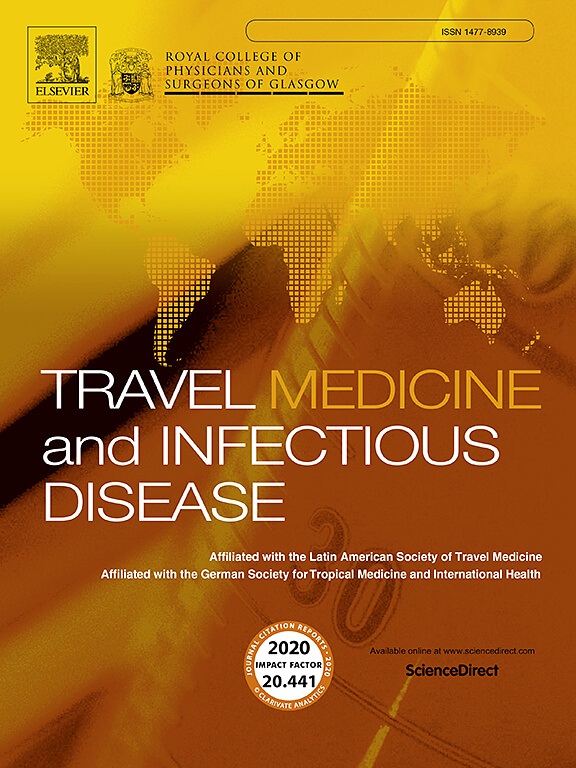双氢青蒿素-哌喹治疗撒哈拉以南非洲恶性疟原虫疟疾的有效性:一项回顾性研究
IF 4.7
3区 医学
Q1 INFECTIOUS DISEASES
引用次数: 0
摘要
背景:以青蒿素为基础的联合疗法(ACTs)是推荐的治疗无并发症疟疾的一线治疗方法。然而,越来越多的关于青蒿素耐药性的报告,特别是在东南亚,引起了人们对以青蒿素为基础的联合疗法疗效的担忧。这项研究旨在评估为期三天的双氢青蒿素-哌喹(DHA-PPQ)治疗输入性无并发症恶性疟原虫疟疾的有效性随时间的潜在变化。方法:采用回顾性观察研究。我们回顾了意大利单一中心治疗无并发症恶性疟原虫疟疾的患者记录(2013-2024年)。纳入标准是在基线和第3天使用DHA-PPQ治疗和寄生虫病的现有数据。主要目的是确定第三天寄生虫病清除率。结果:除1例患者外,其余90例患者均感染于撒哈拉以南非洲地区。我们排除了也门感染的患者,以获得一个更均匀的队列。基线中位寄生虫率为0.136% (IQR为0.029-0.750)。第3天,只有6例(6.7%)患者仍有循环寄生虫,但没有早期治疗失败。随访数据(可获得63例患者)也排除了晚期寄生虫学失败。在2013-2015年、2016-2019年、2020-2023年三个研究期间,第3天的阳性趋势均不显著,p = 0.339)。结论:本研究显示,随着时间的推移,DHA-PPQ治疗从非洲输入的无并发症恶性疟原虫疟疾的有效性没有显著降低。虽然以青蒿素为基础的联合疗法失败在撒哈拉以南非洲仍然很少见,但持续监测至关重要,特别是监测耐药趋势并为治疗方案提供信息。本文章由计算机程序翻译,如有差异,请以英文原文为准。
Effectiveness of dihydroartemisinin-piperaquine for treating Plasmodium falciparum malaria from sub-Saharan Africa: a retrospective study
Background
Artemisinin-based combination therapies (ACTs) are the recommended first-line treatment for uncomplicated malaria. However, growing reports of artemisinin resistance, particularly in Southeast Asia, raise concerns about the efficacy of ACTs. This study aimed to assess potential changes over time in the effectiveness of a three-day regimen of dihydroartemisinin-piperaquine (DHA-PPQ) for treating imported uncomplicated Plasmodium falciparum malaria.
Methods
A retrospective observational study was conducted. We reviewed the records of patients treated for uncomplicated P. falciparum malaria in a single centre in Italy (2013–2024). The inclusion criteria were treatment with DHA-PPQ and available data on parasitaemia at baseline and on day three. The primary objective was to determine the rate of parasitaemia clearance on day three.
Results
All 90 patients but one were infected in sub-Saharan Africa. We excluded the patient infected in Yemen to obtain a more homogenous cohort. Baseline median parasitaemia was 0.136 % (IQR 0.029–0.750). On day 3, only 6 patients (6.7 %) still had circulating parasites, though in absence of early treatment failure. Follow-up data (available for 63 patients) excluded also late parasitological failures. No significant trend in day-3 positivity was observed across the three study periods (2013–2015, 2016–2019, 2020–2023; p = 0.339).
Conclusions
This study revealed no significant reduction in the effectiveness of DHA-PPQ over time for the treatment of uncomplicated P. falciparum malaria imported from Africa. While ACT failure remains rare in sub-Saharan Africa, continued surveillance is essential, especially to monitor resistance trends and inform treatment protocols.
求助全文
通过发布文献求助,成功后即可免费获取论文全文。
去求助
来源期刊

Travel Medicine and Infectious Disease
PUBLIC, ENVIRONMENTAL & OCCUPATIONAL HEALTH-INFECTIOUS DISEASES
CiteScore
19.40
自引率
1.70%
发文量
211
审稿时长
49 days
期刊介绍:
Travel Medicine and Infectious Disease
Publication Scope:
Publishes original papers, reviews, and consensus papers
Primary theme: infectious disease in the context of travel medicine
Focus Areas:
Epidemiology and surveillance of travel-related illness
Prevention and treatment of travel-associated infections
Malaria prevention and treatment
Travellers' diarrhoea
Infections associated with mass gatherings
Migration-related infections
Vaccines and vaccine-preventable disease
Global policy/regulations for disease prevention and control
Practical clinical issues for travel and tropical medicine practitioners
Coverage:
Addresses areas of controversy and debate in travel medicine
Aims to inform guidelines and policy pertinent to travel medicine and the prevention of infectious disease
Publication Features:
Offers a fast peer-review process
Provides early online publication of accepted manuscripts
Aims to publish cutting-edge papers
 求助内容:
求助内容: 应助结果提醒方式:
应助结果提醒方式:


